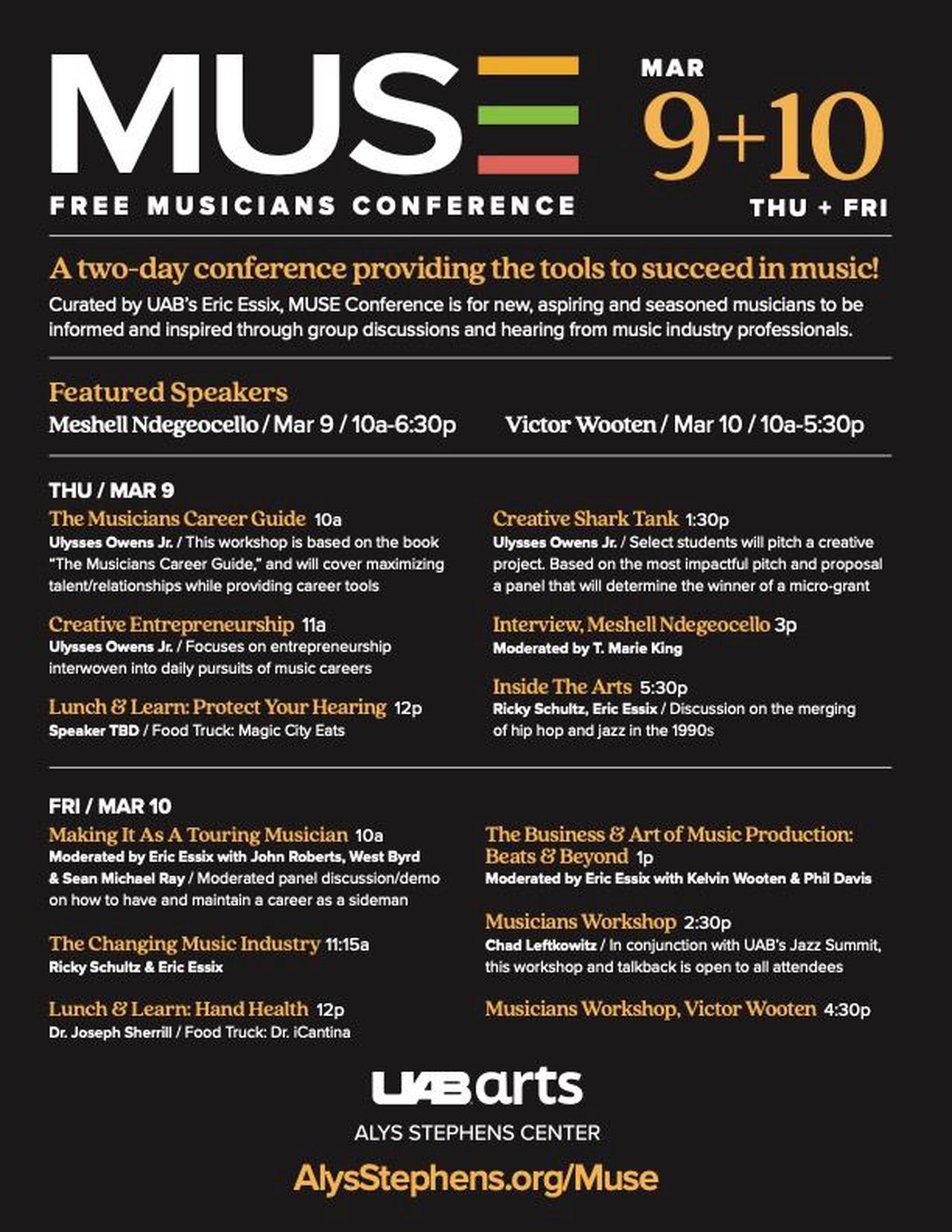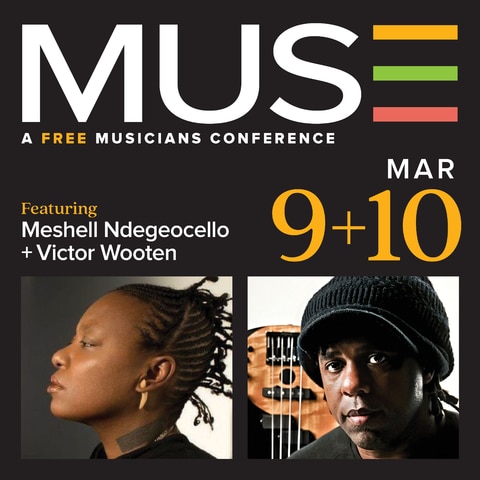MUSE: Here’s what to know about UAB’s free music conference
When Eric Essix was a young musician, he dreamed of opportunities to speak to other artists in the field. He wanted more chances to sit down with other musicians and talk about their creative paths, particularly the business of the music industry, from the intricacies of producing albums to the complexity of planning tours.
“I dreamed of being able to talk to these individuals about what it takes to get to where they are. Firsthand and actually be in the room with them to ask questions and get insight about their careers,” said Essix.
Over the past three decades, Essix has learned— and taught— a lot along the way. The jazz guitarist has built a storied career as a recording artist and producer. In 1991, he was the youngest artist ever inducted into the Alabama Jazz Hall of Fame. He’s an alum of Berklee College of Music. He’s founded record labels, organized festivals, and traveled the world on tour.
2010 marked a turning point in Essix’s career. That year, he accepted a position as the artistic coordinator for the Alys Stephens Center at University of Alabama at Birmingham.
The job merged his talents under one roof. He facilitated the contracts for performing artists and worked with the university’s hospitality department to ensure the team met the artists’ needs. He’d eventually take on additional projects, including making programming decisions for the performing arts center and mentoring students at UAB’s ArtPlay.
The role was also an opportunity for Essix to fulfill a long-held goal: grow into an administrative and teaching role at an arts institution while also advising blooming musicians.
If you let Essix tell it, there weren’t many things in the music industry he hadn’t been blessed to do—a sentiment he expressed to AL.com months after starting the post.
But his passion for helping the next generation of artists also prompted him to reexamine his lasting impact as a musician.
“For many years, I felt that the most important thing was to leave behind a huge body of work. Now, I think of a legacy as being an inspiration to younger musicians,” Essix told AL.com’s Mary Colurso in 2010.
Fast forward to 2023, Essix seems to have achieved both goals. He’s released 28 full-length albums over 34 years. He’s also the director of programming at the Alys Stephens Center, a senior-level position where he works with the UAB arts staff and the community to determine the acts that will grace the stages at the performing arts center.
Every year Essix designs programs that bring artists to the university for performances, lectures and masterclasses. But he’s long had a vision to develop a large-scale music education event at the university—one that would bring industry veterans, blooming musicians, and the public together for multiple days of fellowship, workshops, and performances.
Now, that vision is finally coming to fruition. In March, UAB will host the inaugural MUSE conference, a two-day summit for industry veterans, aspiring musicians, and the public.
The conference, which runs from Thursday, March 9 to Friday, March 10, will feature a series of talks and workshops from an array of industry professionals, as well keynote lectures and evening performances from two featured artists: Grammy-winning musicians Meshell Ndegeocello and Victor Wooten.
Meshell Ndegeocello and Victor Wooten are the featured artists for the inaugural MUSE conference at University of Alabama at Birmingham. (Courtesy, UAB)
Thursday’s sessions will include workshops about career advice and entrepreneurship from producer and drummer Ulysses Owens, Jr. and a discussion about the merging of jazz and hip-hop in the 80s from Essix and senior music executive Ricky Shultz.
The featured artist that day is Meshell Ndegeocello, who will sit down for a discussion with social justice organizer and film producer T. Marie King in the afternoon before a performance at 7 p.m.
MUSE conference sessions on Friday will include panels about navigating a career as a touring musician, changes in the music industry, and the business of music production. That day’s featured artist is bassist Victor Wooten, who will give a musician’s workshop at 4:30 p.m. and a performance at 8 p.m. with Steve Bailey and Derico Watson.
The full schedule and registration information for the MUSE conference is available at alysstephens.org/muse. Registration for the day sessions is free. Tickets for the evening performances from Ndegeocello and Wooten are $39 and available to purchase at alysstephens.org/events.

The lineup of events for the 2023 MUSE conference. (Courtesy, University of Alabama at Birmingham)
Essix’s intention with MUSE was to design a comprehensive program that examines topics from music theory and composition to the music business and musician health (Two panels that weekend will offer musicians advice on how to protect their hearing and the health of their hands).
He’s excited about all of it, particularly the moderated panel discussions with Ndegeocello and Wooten.
“This is an opportunity to talk to two incredible industry icons [and for] our students and our community to be able to do that,” said Essix.
But there’s another underlying accomplishment with MUSE— one that draws on the power of Essix’s network in the music industry and the connections he’s made over three decades in the business.
“In the position that I’m in now, knowing a lot of the folks that are in the industry, I thought, man what an awesome opportunity would it be to expose young musicians, veteran musicians, and people that want to get into the music business to these artists and industry veterans and professionals [so they can] ask questions and just get insight. You know, learn how to further their own careers,” said Essix. “And the MUSE conference was something I came up with to do exactly that.”
We caught up with Essix to talk about the ideas that inspired the MUSE conference and what to expect from the two days of sessions. Here’s an edited version of our conversation below.
AL.com: So let’s talk about Meshell Ndegeocello. She was on the Alys Stephens Center schedule in March 2020. I remember because I was definitely planning to get a ticket and then the COVID-19 pandemic shut the world down. Then last year, I saw her listed on the 2023 ASC schedule.
When you all decided to bring her back, was she originally part of the MUSE conference? Or did you all set a date and then design the conference around her performance?
Eric Essix: The crazy thing is somebody sent me an interview that she did during another music conference. It’s been several years ago now. And watching her do that moderated interview was actually the nucleus…the spark for the MUSE Conference.
When I saw that, I said “I’m going to see if I can book her for an opportunity to perform and do an interview.” And then I said, “Well, shoot, why don’t we just branch this out and make it a full conference with several artists and create a conference specifically designed to have interviews and have talkback and that kind of thing.” So, she was actually the spark for the whole conference. That interview that I saw on YouTube was the spark for the whole thing.
Talk about Victor Wooten. Why did you bring him in as a featured artist as well?
E.E: So, we’ve had Victor before and I’ve done a lot of concerts where artists agree to do clinics or master classes or talkback sessions before their performances. When we had Victor a few years ago, it was probably the best that I’ve ever seen. His session was really well attended [and] he just does a really great job breaking music down to any simple form where anybody can understand certain concepts about improvisation and making music, composing, and all that stuff. So, I said he’s essential for this kind of event cause he’s such a great teacher and is recognized as a great teacher, as well as a world-class bass player.
So the MUSE conference is part performance, part workshops. What are some of the highlights you are looking forward to for the workshops?
E.E: Most of the workshops will be conducted by musicians and producers. But, there are a few sessions that will deal specifically with artists’ lifestyle. We have Dr. Joseph Sherrill who is a world-renowned hand and joint surgeon– and he’s actually my surgeon too. He’s going to be talking about preventive ways or things that you can do to prevent injury to your hands. Any musician will tell you that at some point in their careers, they have had issues with their hands, and maintaining your hands is crucial to your craft. So I thought he would be a good person to have.
Originally we planned to have some people come in and talk about how you can really manage your finances as a musician. That kind of fell through, but I did want the conference to be something that’s comprehensive. You know, something that would address key points in areas of a musician’s life that sometimes don’t get the attention that they should and musicians can end up doing things or not doing things that harm their career. So maybe if we do MUSE next year, we’ll address some of those other topics.
But most of the topics are music-related or about music production and how to advance your career– things that you should be aware of as an up-and-coming artist, a touring artist, and how to start and maintain a career as a touring artist.
If you’re interested in hip-hop and producing music, we’ve got Grammy-winning hip-hop producer, Kelvin Wooten talking about that. We’ve got Grammy-winning producer and keyboardist Phil Davis who will be talking about the same thing.
So, it’s a really comprehensive event that talks about a lot of different things, and we’re not even scratching the surface. We just don’t have the time to address everything. But I thought, man, if we do this next year, we can dive into some of these other topics.
What if you’re not a musician? I’m actually a failed musician, but I plan to go to the Meshell Ndegeocello talk! I’ll stand in the back so I won’t block the students. But I definitely want to hear everything she has to say.
Can people who aren’t musicians but are interested in the craft and study of music come by and attend the sessions?
E.E: With the way I designed the conference, I hope that it’s equally as interesting to people who are non-musicians as it is to musicians.
You mentioned that you’re definitely going to be there for Meshell. You know, this is an opportunity to hear her speak. A lot of times you don’t really get to hear artists talk about what they do. And if you’re a fan, you’re interested in that. You want to hear other things about their lives and how they make music. So I would say that even if you’re not a musician, you’ll find these clinics interesting. If these are artists that appeal to you or if they make music that appeals to you, then you definitely don’t have to be a musician to come and enjoy this conference.
READ MORE:
[How an Alabama producer keeps ending up on huge hits]
[Alabama producer talks J. Cole hit, work with Whitney, Tarantino, Erykah Badu]
